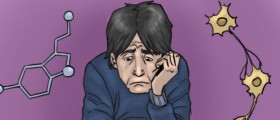
Cymbalta is a brand name for duloxetine hydrochloride, a drug produced by Eli Lilly and Company. Cymbalta is an antidepressant that belongs to a group of serotonin and noreprinephrine reuptake inhibitors (SNRIs). SNRIs antidepressants act on chemical messengers, or neurotransmitters in the brain, serotonin and noreprineprine. Disturbed levels of these neurotransmitters affect communication between the brain cells and lead to anxiety, depression and other mood disorders. SNRI antidepressants restore balance of the messengers thus boost mood. Cymbalta is also used for relieving pain caused by certain medical conditions. Although it is not completely understood how Cymbalta acts regarding pain, it seems that the drug blocks the pain signals in the brain and spinal cord.
Cymbalta IndicationsCymbalta is used for treating several conditions. It is most commonly prescribed for treating major depressive disorder (MDD), also called clinical depression or simply depression. Cymbalta is also effective in treating generalized anxiety disorder (GAD). In addition to managing symptoms of mood disorders, Cymbalta helps in treating aches and pains caused by fibromyalgia, chronic musculoskeletal pain like back pain or arthritis pain and diabetic peripheral neuropathy pain characterized by aching, burning, numbness and tingling of extremities. Sometimes, Cymbalta is given for managing urinary incontinence and interstitial cystitis.
Cymbalta Withdrawal
Cymbalta, like any other SNRI antidepressants induces withdrawal symptoms if it is discontinued abruptly. This is also known as antidepressant discontinuation syndrome. Cymbalta withdrawal symptoms are both physical and psychological and most commonly include irritability, dizziness and headaches. To prevent or reduce these symptoms, Cymbalta dosage must be gradually reduced. According to manufacturer, the doses must be slowly reduced over the course of couple of weeks to months. After treatment cessation, withdrawal symptoms appear after a week and may last up to three weeks. Usually the withdrawal symptoms are mild and do not require any treatment. However, sometimes Cymbalta withdrawal symptoms can be severe and require resuming Cymbalta treatment. In that case, a physician must decrease dosage at a more gradual rate.
Cymbalta Withdrawal SymptomsIn clinical trials, Cymbalta withdrawal symptoms were observed in up to 44% of people who suddenly stopped taking the medicine. Symptoms of Cymbalta withdrawal included dizziness in up to 12 %, nausea in up to 6%, headache in up to 5.3%, sensations such as tingling and burning in up to 2.9%, vomiting in up to 2.4%, irritability in up to 2.4% and nightmares in up to 2% of people treated with Cymbalta. Other withdrawal symptoms associated with Cymbalta include: agitation, anxiety, confusion, insomnia, hypomania, lethargy, tinnitus, emotional lability and seizures.







_f_280x120.jpg)
-Signs,-Symptoms,-Treatment-And-Prevention_f_280x120.jpg)








Your thoughts on this
Loading...